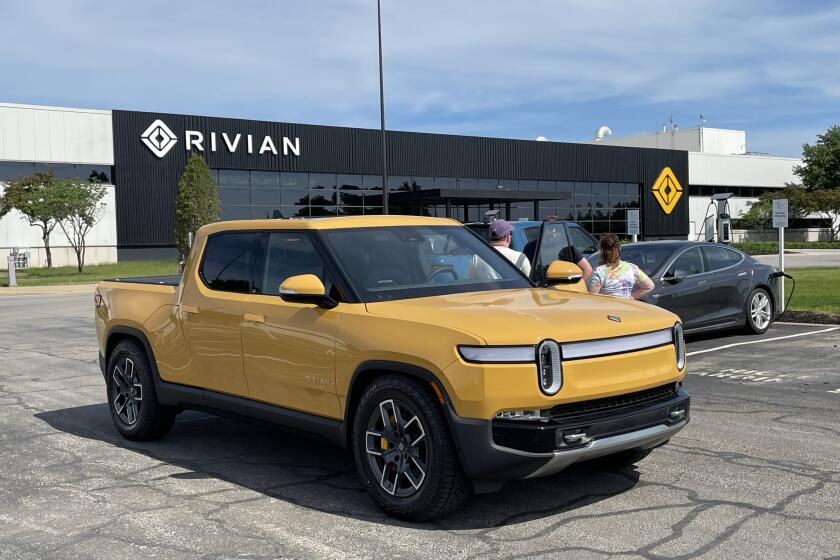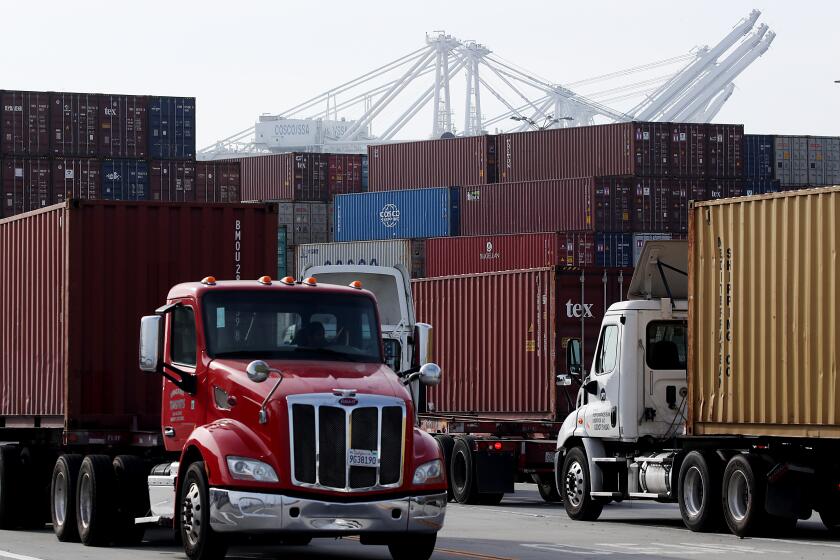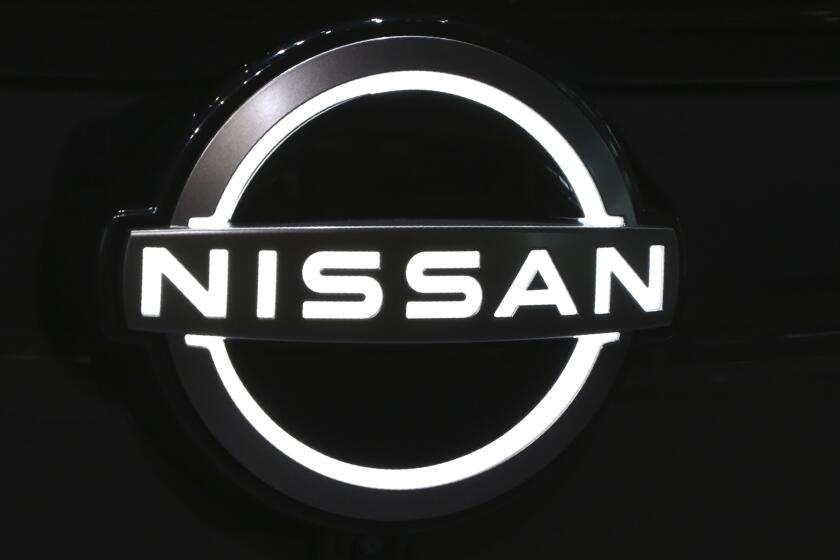Trying to Pull the Plug : Big Oil Companies Sponsor Efforts to Curtail Electric, Natural Gas Cars
As California presses ahead with its rule forcing auto makers to sell cleaner-fueled vehicles, including a virtual mandate to sell electric cars beginning in 1998, big oil companies have been largely silent.
But now the companies have found their voice--or, more accurately, the voice of others--by quietly bankrolling what on its face appears to be a grass-roots campaign against $600 million in proposed utility investments in alternative-vehicle support systems.
A new group called Californians Against Utility Company Abuse--run by Woodward & McDowell, a high-powered Burlingame, Calif.-based public relations firm--gathered petitions and demonstrated Wednesday in front of a regional office of Southern California Gas Co. The group also recently mailed a letter to 200,000 utility ratepayers statewide. It does not mention oil industry support in its literature.
In response, a freshly forged coalition of the utilities, labor and environmental groups is angrily burning up fax machines across the state, labeling the tactics of its opponents a “dirty trick.”
Until now, the debate over alternative-fuel vehicles has focused on efforts by the Big Three auto makers to weaken or delay the state’s mandate for introducing electric cars by 1998.
But many proponents are now convinced that the mandate will be upheld by the California Air Resources Board next month, citing the as-yet-unwavering support of Gov. Pete Wilson’s administration, as well as a final report by the ARB staff, expected to be released later this week, that proponents say will confirm that the technology will be there to meet the 1998 deadline.
The oil-company-funded letter urges taxpayers to send accompanying postcards to their state legislators in support of two bills designed to curtail utility company plans currently before the Public Utilities Commission.
Required by state law, these are plans by the gas and electric utilities to promote the use of natural gas and electric fuel. The utilities propose to spend the money--charged to ratepayers, not shareholders--on public refueling stations, rebates for car buyers and other infrastructure support for the new vehicles.
*
Opponents argue that this amounts to a subsidy by ratepayers of alternative-fuel vehicles that will benefit only the few who can afford to buy them.
The mailing cites two prominent consumer groups--Toward Utility Rate Normalization and Utility Consumers Action Network--as well as the California Business Alliance and other business groups as supporters. But it does not mention that the effort is almost entirely funded by the Western States Petroleum Assn., which represents oil companies.
The Clean Air Alliance, a new parallel group that presents technical and economic arguments against electric cars, is also funded primarily by the oil industry.
“It’s clearly our money,” said Douglas F. Henderson, executive director of the Western States Petroleum Assn., based in Glendale, who added that he did not have a figure for how much money the association has put into the effort.
“We think there’s a far better alternative” to mandating use of alternative fuels, Henderson said, “and that’s the use of our products. . . . And you may think that’s selfish, but our industry is spending $5 billion in California alone to upgrade our refineries to supply the new generation of gasoline, which is a very clean alternative.”
*
All gasoline sold in the state as of next January must meet federal standards for cleaner-burning, so-called reformulated gasoline. The state’s much stricter reformulated blend must be used beginning in March, 1996. The oil companies have long argued that reformulated gasolines and improved auto engines can meet air pollution emission standards without the need to resort to electric and natural gas cars.
In the letter to ratepayers, TURN Executive Director Audrie Krause and Howard R. Owens, legislative director of the Congress of California Seniors, call the utilities’ request a “hidden tax on your gas and electric bill” and urge that fellow taxpayers “join California consumers, seniors, business and farmers in this ratepayer revolt.”
Krause and Owens urge support for SB 1819, introduced by state Sen. David Kelley (R-San Diego) and AB 3239 by Assemblyman Mickey Conroy (R-Orange). Krause says TURN and the oil companies just happen to be on the same side in this dispute.
“The Kelley bill is TURN’s bill,” Krause said. “We wrote it, we sponsored it and the oil industry chose to support it. We didn’t come to them. They came to us.”
The new group on the other side of the issue--Santa Monica-based Californians for Jobs and Clean Air--represents the utilities, environmental groups and businesses entering the advanced-transportation industry.
“That the oil companies are starting what they call a grass-roots effort . . . makes me feel the most positive yet that electric vehicles are really going to happen,” said Diane O. Wittenberg, manager of electric transportation at Southern California Edison Co.
Wittenberg said the new oil industry-consumer coalition is not only unfairly secretive but misrepresents the benefits of the utilities’ plan.
Not only are electric and natural gas cars necessary to meet clean-air goals, she says, but in a future substantial shift from gasoline to electricity as a transportation fuel, ratepayers would actually save because the costs of the utility infrastructure would be spread over a larger customer base.
Indeed, Edison estimates that in coming decades, a 20% to 30% market penetration by electric cars could save ratepayers as much as $11 on their monthly bills.
As for the secrecy, Henderson of the oil trade group admits that “people are often more willing to join hands with a coalition than they are to join hands with the petroleum industry, and that’s fine. . . . We’re not ashamed of it at all.”
Ever-Cleaner California Cars
As part of California’s requirement to meet federal clean-air health standards, the state Air Resources Board in 1990 adopted a plan to dramatically lower emissions from vehicles, which are estimated to cause more than 70% of the state’s air pollution. The plan, currently under review, mandates a potentially wide-ranging shift of vehicles and fuels between 1998 and 2003.
*
Categories of vehicles required under ARB plan and their most likely fuels:
Allowed hydrocarbon emissions Vehicle type (grams per mile) Likely fuel Federal standard 0.25 Reformulated gasoline LEV (low-emission 0.075 Reformulated gasoline vehicle) ULEV (ultra-low- 0.04 Natural gas; some emission vehicle) electric-other fuel hybrids; perhaps some reformulated gasoline ZEV (zero- 0 Electricity; longer-term; emission vehicle) hydrogen fuel cells
THE CHANGING MIX OF CALIFORNIA CARS
Deadlines for introduction of vehicle types in California, based on estimated total new vehicle sales of 2 million a year (figures in thousands): 2003: Federal standard: 0 LEV: 1,500,000 ULEV: 300,000 ZEV: 200,000
Source: California Air Resources Board



